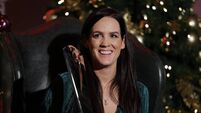Aisling Bea: 'It gives me joy to find a bargain — I wear pieces on telly that I found for three quid'

Aisling Bea for Oxfam Secondhand September campaign. Picture: Eoin Greally
We all love clothes, the way we all love food.
Which is why, if the fashion industry were a country, it would rank sixth globally as a producer of greenhouse gases, responsible for around 10% of all emissions. All down to our addiction to buying new clothes.
Clothing production stats are insane — there are between 80-150bn garments produced annually (nobody knows exactly how many because, of the 250 largest global garment brands, 88% don’t disclose their product volume).
According to the Environmental Protection Agency, when it comes to buying new clothes, Irish people are super consumers, adding an average 53kg of new textiles to our wardrobes each year.
This is double the EU average — despite already owning an average of 140 garments each. That’s a lot of clothes. Yet 82% of us would not consider buying second hand.
Which is why Bafta-winning comedian, actor, and screenwriter Aisling Bea elected to become the face of — “Victoria’s Secret!” she laughs. She’s kidding.
Bea is on the phone to talk about being the face of Oxfam Ireland’s Second-Hand September campaign. Rather than slinking about pouting in fancy lingerie, she deadpans: “I’m fine being the face of second-hand clothes.”
The Oxfam campaign features herself and her baby daughter wearing beautiful clothes, all of which are second-hand. She’d like to see more of us wearing more second-hand, for all sorts of reasons.
We spend a moment enthusing about the joys of second-hand, vintage, pre-loved, hand-me-down, charity shopping; the thrill of finding buried treasure, the satisfaction of spending a fraction of what something costs new. She’s a genuine fan.
(Me too — as we speak, I’m wearing Nicole Fahri trousers (£20), a silk Cos top (£15), and a Sweaty Betty hoodie (£12). All my adult life, at least 50% of my wardrobe has been second-hand.)
“In London, second-hand is a big thing,” Bea says of her adopted home city. Yet in Ireland, it seems the idea of second-hand still gives us the ick. We remain reluctant.
She wonders if it’s “an attachment to pride”, that if you “have to take second-hand, it says something about you — or for your kids, it means they’re not special”.
That we associate second-hand with second-best.
“I think we’re turning the tide,” she says.
“I grew up on second-hand clothes – I have 17 cousins all around the same ages, so we were always getting someone else’s toys and clothes and shoes. I feel like we lost that somewhere in the ‘90s during the economic boom,” she muses, wondering aloud if we became addicted to “showing off new stuff all the time”.
“We’re all paying for that now,” she says.
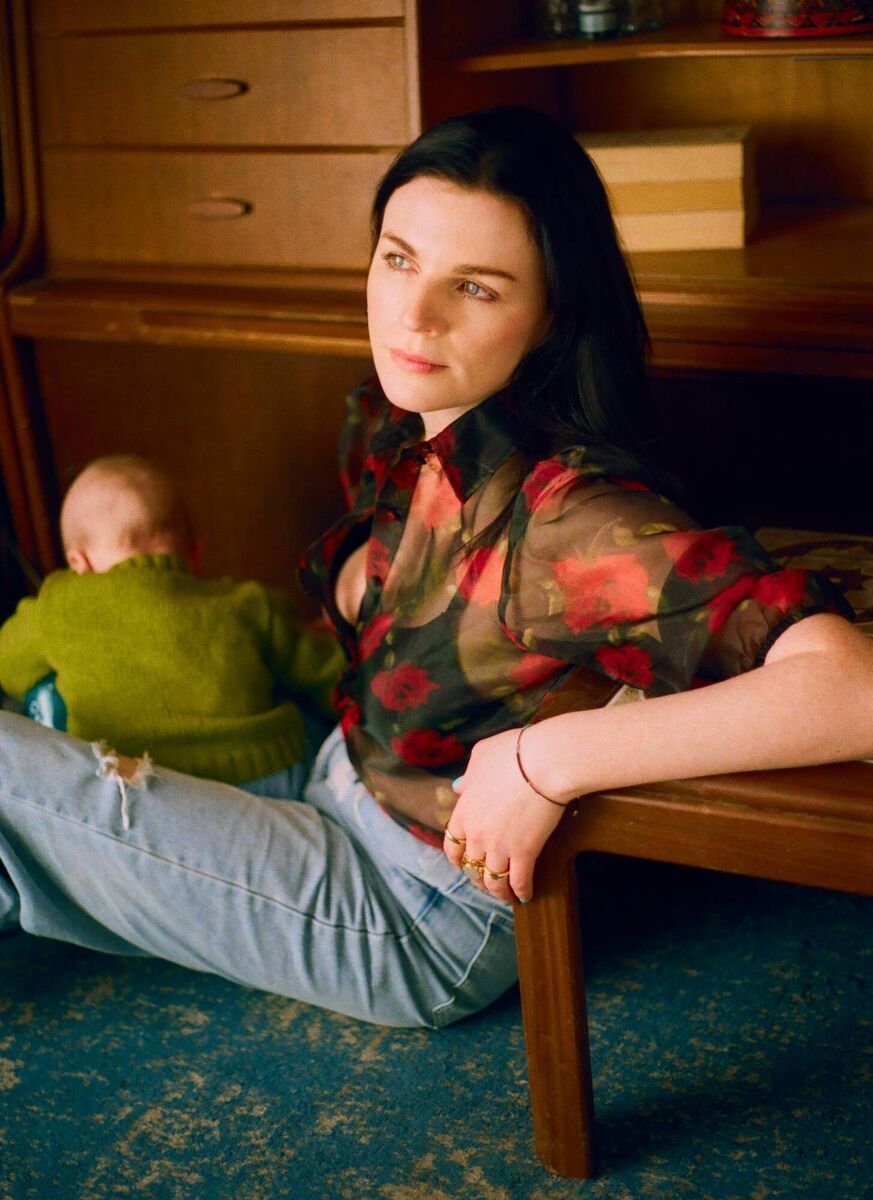
Bea says she’s wanted to get involved in Oxfam’s Second-Hand September campaign for years.
“We have to rebrand second-hand — that it’s a brilliant choice, you’re supporting a charity, you’re not buying something new,” she says.
She recalls being on an acting job in Dublin years ago and going for a mooch around the charity shops with another actor, who said to her: ‘But why would you shop there? You’re doing fine.’
“Like I was looking in the bin for food!”
“It truly gives me joy to find a bargain,” she says. “I still have pieces I wear on telly that I found for three quid in a charity shop 10 years ago.”
We seem especially reluctant to dress our kids in second-hand — the idea being that, as babies are brand new, their clothes need to be too.
The result is mountains of garment waste. Bea dresses her baby Saoirse, who has her first birthday this month, in hand-me-downs from the kids of her friends, fellow comedians Sara Pascoe and Katherine Ryan. “I love sending them pictures of my baby [in their children’s clothes],” she says.
We talk about the specialness of a garment travelling from child to child through a family or friendship group, gaining heirloom status as it is passed on; how the item becomes so much more meaningful than something anonymous and off-the-peg.
She hopes that this appreciation will develop alongside greater awareness of fast-fashion waste.
“It’s very hard to roll something back — it’s better to reframe,” she says. “People only stopped buying so many bottles of water when keepcups and water bottles became a fashion accessory.”
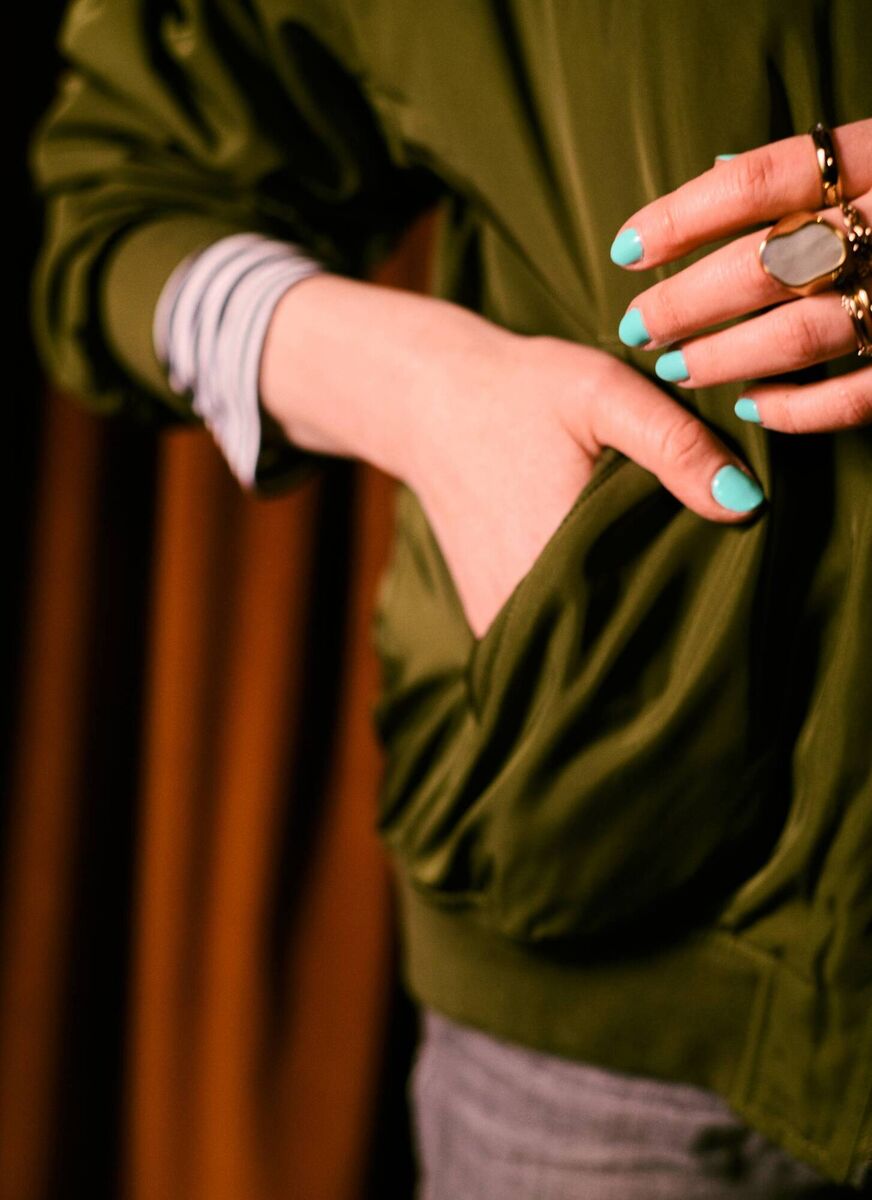
Given how brilliant Ireland is at radical social change — from banning smoking and plastic bags to embracing liberal secularism — there’s no reason why we can’t change our attitudes towards second-hand clothing as being the coolest choice, rather than something inferior.
“We’re all just human, trying our best,” she says, adding that she’d “never recommend anything I haven’t tried myself”.
Understandably, becoming a parent has sharpened her focus on sustainability.
Bea and her partner, musician Jack Freeman, have had a busy year. They moved house from Angel to Hackney in London, Bea got pregnant and had a baby, all the while working (“A really calm time as you can imagine”).
Despite giving her pregnancy a comedic one-star Tripadvisor review — no breakfast and a limited drinks menu, plus “UTIs, bleeding, depression, cramps, insomnia, nosebleeds, sinus blockage, migraines, vomiting, and being randomly touched by people without asking” — these days Hackney family life sounds grounded and fun.
Her mother Helen recently moved to London after a lifetime living in rural Kildare, to be nearer to Bea, her younger sister and costume designer Sinéad O’Sullivan, and their small children.
“I’m so inspired by my mother,” says Bea.
“Within a week, she was friends with the binmen, she was watering the neighbours’ plants, it was like she’d been here all her life. She’s a very present, alive person. It’s all about community and how you treat people.
“She’s the one who visits the elderly and has a laugh with them, the one who makes sure everyone gets a Christmas card, does the Christmas toy donations, is an incredible granny — and not just to her own grandchildren. I have that sense of community too, and I hate injustice. That’s what fuels me a lot of the time. I get it from my mother.”
Bea walks the walk. She’s active, not just with the current Oxfam campaign, but harnesses her many, many showbiz connections to raise awareness — and funds — for food banks, refugees, Palestinian causes, Repeal the 8th, equal marriage. As well as a social conscience, another gift she received from her mother was social confidence — as anyone who has witnessed her owning giant stages performing stand up, or being fearlessly hilarious on panel shows hosted by people like Jimmy Carr and Sandi Toksvig, will attest to.
“I have never been shy in my life,” she says.
“My mother has never had a problem walking into a social situation, and neither have I.”
Aisling O’Sullivan was born in Kildare in 1984. Her mother was a professional jockey, her father Brian an equine vet. When she was three — and her sister three months — her father died by suicide.
Aged 13, her mum told her how he’d died.
I ask about that 10-year gap between losing him and finding out how he died, but she’d prefer not to talk about it. Instead, she refers me to The Guardian article she wrote in 2017, around the 30th anniversary of his death, in which, at one point, she addresses him directly: “I think you would have been proud to watch your daughter do stand-up at the O2 and sad to see my mother watching it on her own. Then again, if you hadn’t died, I probably wouldn’t have been mad enough to become a clown for a living. I am your daughter and I am really fucking funny, just like you.”
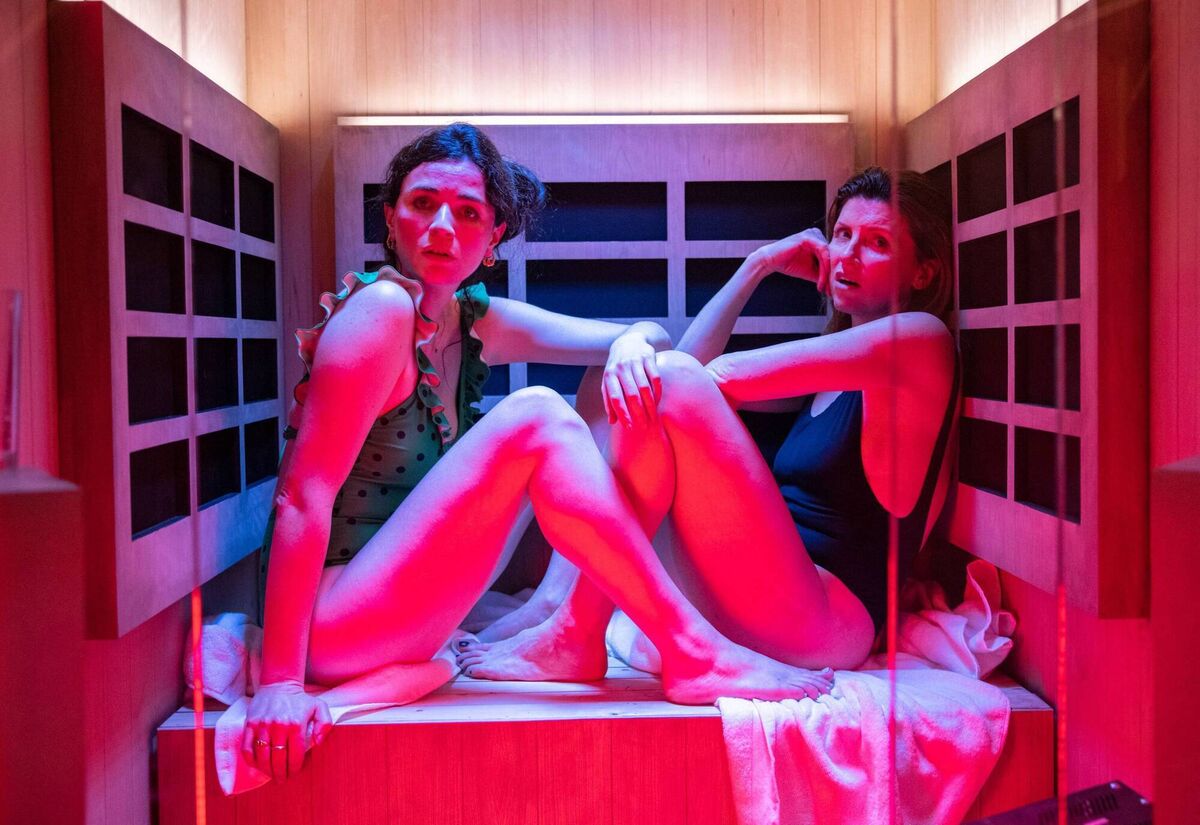
Aisling was not interested in the Kildare horse racing scene — she wanted to act. After French and philosophy at Trinity, she studied at the London Academy of Music and Dramatic Art (LAMDA) and changed her name to Bea, in tribute to her dad.
“I’ve been a stand-up for almost 20 years,” she says. “I gig every week.” Her proudest achievement is her two-season Bafta-winner , which she starred in with Sharon Horgan.
“In terms of acting, I’d like to see more interesting, nuanced female characters,” she says.
“Not more girlfriend characters running a cupcake company — nothing wrong with cupcake companies, but there are other jobs. I’d like to see more messy knobhead [female] characters.”
She’d also like to work with Paul Rudd again, after doing the 2019 Netflix mini-series together.
“I’d love to do something with Paul where we get to be total idiots,” she says.
“That job was such a special time in my life — I was single, got to move to New York for six months, it was one of the social times of my life. Paul and his family were so lovely to me. When you work with someone you become close with their families too.
“In stand-up, you get to work with your friends all the time. Nish [Kumar] and I are absolutely madly in love as friends. I’d love to work with Domhnall Gleeson again — we had such a ball in [PBS dramedy] Alice & Jack.”
I have to ask: Any never-agains?
“Ha! As if I’d ever say to a journalist,” she laughs.
It’s actually quite hard to imagine her being mean about anyone: “I give people the benefit of the doubt.
“If you work with lots of people, you may not always be meeting everyone at the best time of their life.”
She’ll be embarking on a big comedy tour next year, two hours alone on stage.
“The audience is going to have to be my friend,” she says. “My favourite place in the world to be is backstage at stand-up gigs. It feels the same no matter where you are — Australia, Canada, Ireland — I absolutely love it.”
There’s a new project in the pipeline which she says will particularly interest Irish people, but can’t speak about it just yet. For now, she’ll carry on making people laugh, raising her baby, rifling through charity shops, and living her best Hackney life with her family around her.
“When love is consistently thrown at you, that’s the best thing you can have as a kid,” she says.
She adds: “I got the boyfriend pre-loved as well.”
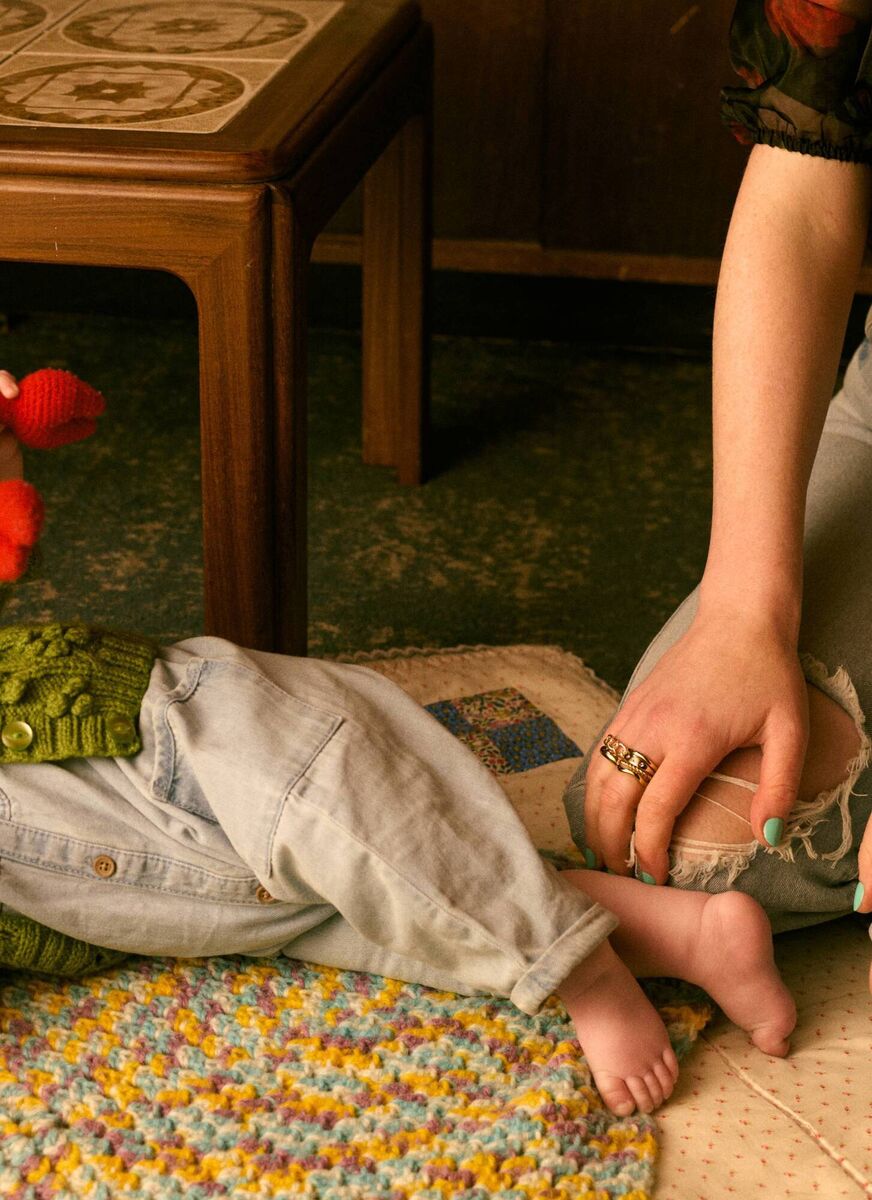
In Ireland, it is believed to be up to 140 items per person.
Source: WRAP (UK), “Valuing Our Clothes” Report.
This includes avoiding emissions from manufacturing, transport, and packaging.
Source: ThredUp 2023 Resale Report, based on Green Story environmental analysis
Reusing clothing saves huge amounts of water and energy.
Source: WWF International.
Even worn-out items can be reused if donated properly — don’t bin them!
Source: European Commission, Circular Economy Factsheets – Textiles (2023)



